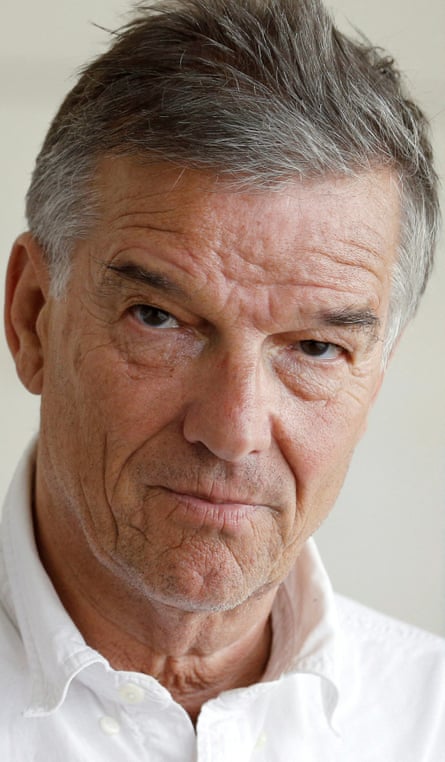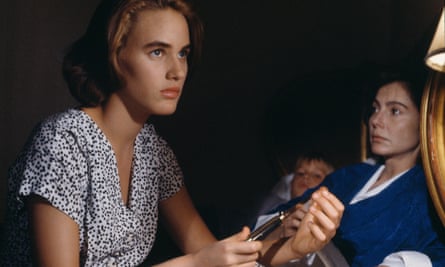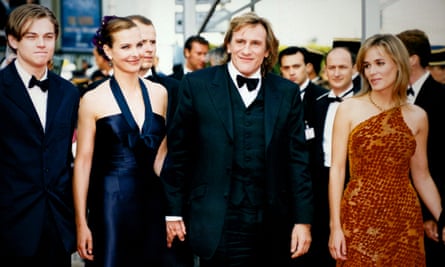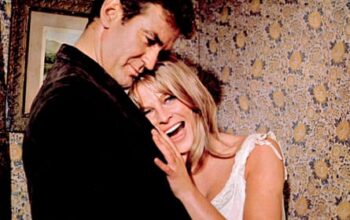I
The new French film “Con” is a comedic tale about a famous French movie star who comes back to Paris after ten years in Los Angeles, hoping for a successful return but instead finds herself playing the role of a singing hamster. It has become the most popular streaming show in France this year, leading to heated discussions about the film industry’s failure to address the #MeToo movement. Through flashbacks, the show delves into the personal story of Judith Godrèche, the show’s writer, director, and lead actress, who was groomed by one of France’s top directors when she was only fourteen in the 1980s.
“I felt compelled to share this story for future generations,” states Godrèche, currently residing in Paris again. “When my own daughter reached 15 years old, she was a student at an arts school in LA, pursuing dance and acting. I saw her walking around in her leotard and was overcome with fear. I knew that what happened to me should never happen to her. That is why I wrote this, for her and her peers, for all the young girls.”
The depiction of Godrèche’s 14-year-old character being consistently given alcohol by adults at a film awards dinner until she becomes unconscious, or is yelled at, or coerced into removing her top on set, has caused the series to gain popularity through word-of-mouth and sparked introspection in France. Godrèche reveals that during her teenage years, she had no support from anyone in the industry, and no adults ever intervened. “Not a single one. And they’re still in hiding,” she states. “Those who are still active in this industry are still not speaking up. I’m not trying to start a witch-hunt, but one would expect some empathy… It’s strange for everyone that I am now speaking out and sharing this story. The code of silence in the industry is still incredibly strong.”

Godrèche, who was born in Paris, began her acting career at nine years old, living with her father after her parents’ separation. At the age of 14, she was cast in the film Les Mendiants by renowned director Benoît Jacquot, who was 40 at the time, and they became romantically involved. At 16, she used her earnings to purchase a flat with Jacquot and their relationship was heavily covered by the media. Godrèche states that she was openly groomed by the French film industry and journalists, with magazines in the 1980s often featuring photos of the couple at various events, portraying their relationship as romantic and sexualizing her as a young woman in love with an older man. She was able to end the relationship at the age of 20. Jacquot’s agent did not respond to a request for comment.
Godrèche chose not to name Jacquot in her series. “I wanted the subject to exist in all its scope and resonance, not to become a niche story about him,” she says. “This series is about exposing a whole system. I thought if I named him, every article would have him in the headline, eclipsing a show which represents the first time I had fully embraced my voice as a writer.”
However, the success of Icon of French Cinema, a joint production between American studio A24 and French-German channel Arté, brought about change. It struck a chord during a time of intense reflection in France regarding the grooming of young girls by older men in the arts. The film was based on Vanessa Springora’s 2019 book, Consent, which recounted her experience of being groomed at 14 years old by 50-year-old writer Gabriel Matzneff in the 1980s. This story has since been adapted into a popular film. As a result, Paris prosecutors have launched an investigation into Matzneff for the rape of minors, which is currently ongoing. Adèle Haenel, who began her acting career as a child, made headlines last year when she left the French film industry due to its tolerance towards sexual predators.

Godrèche has received numerous letters from women who related to her experience. Many women shared that they were also from her generation and had been approached by older men when they were teenagers. They believed it was acceptable because they admired Godrèche’s beauty and fame. She felt a sense of duty and accountability, knowing that her actions may have influenced other young girls to accept similar behavior. This caused her to feel guilty.
In the beginning of this month, Godrèche received a weblink to a TV documentary from 2011 where Jacquot discussed their romantic involvement. He mentioned that the younger Godrèche was unconcerned and attracted to their age gap. He also shared that the film industry looked up to him for their relationship, which he found satisfying.
Godrèche took to social media to name Jacquot. She expressed, “I can no longer keep this name quiet, the little girl in me.”
According to Godrèche, while watching the documentary, she experienced intense physical reactions including shaking and vomiting. She also felt overwhelmed with feelings of disgust and anger, leading her to realize why she had previously left France. She questioned how the documentary could have been aired in 2011.
In 2017, she was among the first actors to disclose to the New York Times her encounter with film producer Harvey Weinstein. She stated that at the age of 26, Weinstein tried to assault her in a hotel during the Cannes film festival. Last year, Weinstein was found guilty of rape and sexual assault in Los Angeles.
However, there are still many individuals who believe that the tightly-knit community of French arthouse cinema has not fully addressed the #MeToo movement. Feminists expressed anger last month when French president Emmanuel Macron referred to actor Gérard Depardieu, who is currently under investigation for rape and facing criticism for sexist remarks, as the victim of a “manhunt”. Depardieu has denied all accusations.
The Godrèche series is expected to be marketed globally. She states, “I do not want this to remain in France. It is crucial that it is not hidden. I want other audiences to see it, especially because America played a significant role in my ability to write it. The #MeToo movement and the events surrounding Weinstein in America gave me the inspiration to produce it. There is a connection to what happened in the US that gave me the courage.”

Unfortunately, the account of her upbringing has struck a chord with viewers. “I hope it can offer support to those who feel isolated or burdened like I did. I have spent my entire life attempting to break free from this aspect of my childhood, and to find a way to avoid seeking approval from him and the society he belongs to. One of my greatest apprehensions was receiving negative evaluations from the media outlets that have idolized him.”
Fourteen-year-old actress Alma Struve portrays the role of young Godrèche, which involves a scene where she has to remove her shirt and kiss an older director multiple times. Struve was surprised to learn that this scenario could have actually occurred. Godrèche comments, “It was fascinating to see her reaction to it.”
Struve did not change her attire because there was a stand-in and a consultant present to ensure intimacy. Godrèche reflects, “During my era, I had no one to talk to. No one ever checked in on me and asked if I was alright. It is quite remarkable to see what is now achievable.”
The show alternates between two time periods – the extravagant present-day Paris and a darker 1980s France – and has received praise for its slightly absurd and self-deprecating tone. In the modern scenes, Godrèche purposely captures a romanticized version of Paris that she longed for while living in the US. British comedian and writer Liz Kingsman stars as Godrèche’s agent, and they messily devour large amounts of food in various restaurant scenes. “I wanted to be honest,” Godrèche explains. “I want to fully enjoy the cake, not just take a small bite and deliver my line. There is a sensual element to it. Let’s not shy away from who we are, our desires, or our mistakes in this patriarchal society where we are constantly shrinking ourselves. Let’s not be afraid to take up space and show our strength!”

The current ensembles are exaggerated and comedic. Godrèche remarks, “You might wonder why she’s dressed like she’s in Gone with the Wind on this small boat.” The side story about a Filipino housekeeper, along with its surprising ending, is based on a real event and features Godrèche’s former housekeeper in the role.
Tess Barthélemy, daughter of Godrèche, portrays her mother’s character in the series. However, she was unaware of her mother’s real-life experiences until now. “I have carried guilt with me my whole life, and it’s a story I never shared with my children,” confesses Godrèche.
She explains that grooming is a complicated issue that requires careful examination. These individuals often present themselves as guardians, assuming a parental role – in the show, you witness the protagonist transition from her father to the director. The goal was to portray a young girl who first appears with her father, but then is seen with a man who is similar in age. With her mother absent, there is some level of dysfunction within the family dynamic.
The main character in the series, who is a 50-year-old film star, manages to navigate modern life with ease. She never had a traditional childhood and there is a part of her that remains childlike. People often commented on how she matured at a young age, but in reality, it was more of a result of her life experiences, societal norms, and the way others treated her. This does not necessarily mean that she truly became an adult, or that she has ever felt like one.
Godrèche is optimistic that the support from French audiences will have a global impact. She expresses her appreciation for the strong sense of sisterhood that exists.
Source: theguardian.com


